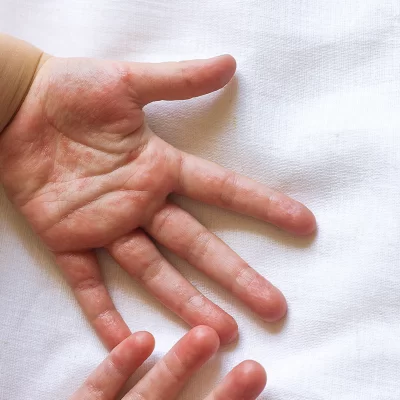Hand eczema
What is eczema on the hands?
Hand eczema, also known as dyshidrotic eczema, is a chronic inflammatory skin condition. Its causes are complex. It is worth noting that this is a non-infectious condition, but it often recurs. Periods of improvement (remission) alternate with periods of visible skin changes. Eczema can significantly reduce the quality of life of patients due to bothersome symptoms. It is sometimes considered an occupational disease, particularly affecting individuals who have frequent contact with water or irritating substances.
Hand eczema is a complex condition whose development results from the interaction of many factors, both internal and external. Genetic predispositions play a key role in weakening the skin's natural protective barrier, leading to abnormal immune system reactions. Often, the issue is also exacerbated by allergens such as:
-
nickel,
-
plant pollens,
-
dust mites,
-
animal dander,
-
mold,
-
foods.
Equally dangerous are irritating substances, including detergents, soaps, chemicals, as well as certain cosmetics. Additionally, the following factors can worsen symptoms:
-
stress,
-
hormonal disruptions,
-
unfavorable weather conditions,
-
frequent hand washing,
-
mechanical irritations.
All these factors can trigger reactions, both allergic and non-allergic.
How does eczema on hands manifest? Symptoms vary depending on the stage of the disease. In the initial acute phase, the hands intensely itch, become red and swollen. Also characteristic are small bumps and fluid-filled blisters. When these blisters burst, they leave oozing erosions that eventually crust over. At this point, the skin can be very painful, prone to cracking easily, leading to the formation of wounds and increasing the risk of infection.
The chronic phase progresses very differently. In this stage, the skin is noticeably dry and scaly. Thickening of the skin, known as lichenification, is often observed. Permanent scars and discoloration may also appear.
Eczema on the hands can manifest in various ways. However, crucial to effective treatment is recognizing the symptoms. Let's take a look at the most commonly encountered types of eczema.
Contact dermatitis occurs when the skin reacts to allergens or irritants. It is nothing but allergic skin inflammation, often referred to as contact eczema on the hands.
Atopic dermatitis (AD) is a chronic condition, usually with genetic factors as its underlying cause. It is also known as atopic eczema.
Dyshidrotic eczema is easily recognizable by small fluid-filled blisters that are extremely itchy. This type of eczema is also known as dyshidrotic eczema.
In addition to the mentioned types of eczema, there are also other forms, such as:
-
occupational eczema - directly related to the work being done;
-
nummular eczema - characterized by round skin lesions;
-
seborrheic eczema - also known as seborrheic dermatitis;
-
photoallergic eczema - a rare form triggered by sun exposure.
To effectively treat eczema on the hands, consultation with a specialist - dermatologist or allergist, is necessary. The therapy includes various methods tailored to the individual needs of the patient:
- the use of topical medications that combat inflammation, such as steroid ointments (e.g., hydrocortisone) and calcineurin inhibitors (e.g., tacrolimus, pimecrolimus),
- in more severe cases, taking oral medications, including antihistamines (to relieve itching), antibiotics (to treat infections), as well as immunosuppressive drugs (e.g., cyclosporine, methotrexate, azathioprine) or retinoids (e.g., acitretin),
- treatment with phototherapy using UV light,
- conducting allergic tests, especially patch tests, to identify factors that trigger eczema.
The selection of the most effective form of therapy must be made based on test results and the specialist's assessment.
Home remedies can effectively help in combating hand eczema. They utilize natural ingredients with anti-inflammatory and antibacterial properties that help alleviate troublesome symptoms.
Relief can be provided by various baths, including those with added oat flakes, as well as hypochlorite and potassium permanganate baths.
It is worth applying directly to the skin:
-
Aloe vera gel,
-
Coconut oil,
-
Shea butter,
-
Honey,
-
Tea tree oil.
One should not forget about the diet. It should be rich in omega-3 fatty acids, omega-6 fatty acids, and gamma-linolenic acid. It is also worth taking care of antioxidants that support skin health.
One can also consider supplementing with probiotics, which help maintain a healthy gut microbiome.
Regular moisturizing and lubricating the skin is an important element in combating eczema. Emollients - creams, ointments, and emulsions that effectively rebuild the skin's natural protective barrier - are essential for skin care. These specialized products are rich in active ingredients such as ceramides, urea, allantoin, and D-panthenol. These substances intensely moisturize the epidermis, improving its elasticity and overall condition.
To prevent eczema flare-ups and recurrences, it is necessary to:
-
Avoid irritating factors,
-
Use only gentle hand cleansers, preferably soap substitutes with a low pH,
-
Wash hands with lukewarm water,
-
Gently pat hands dry after washing,
-
Wear protective gloves (vinyl or cotton) that effectively protect delicate hand skin when in contact with detergents, chemicals, or water,
-
Limit stress,
-
Avoid excessive hygiene, which prevents skin dryness and protects it from unwanted reactions.
